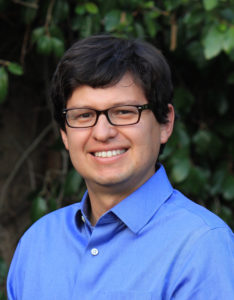 Dr. Juan Pablo Giraldo is an Assistant Professor in the Department of Botany and Plant Sciences at the University of California, Riverside. He initiated working on plant nanobiotechnology at the Massachusetts Institute of Technology as an NSF postdoctoral fellow. He received his Ph.D. in plant biology from Harvard University (2011), and B.S. in both biology and physics from University of Los Andes in Bogota, Colombia. Since 2015 the Giraldo Lab at UC Riverside works at the interface between plant biology and nanotechnology. Nanomaterials have unique optical, electronic, and chemical properties that have been widely exploited in biomedical research, but their use in plant biology research and agriculture remains largely unexplored. His lab aims to develop nanoparticle-based research tools to study and engineer plant function at levels of organization ranging from organelles to tissues and whole plants. Dr. Giraldo has published 29 peer reviewed articles in leading journals including Nature Materials, Nature Nanotechnology, Nature Communications, ACS Nano, and Nano Letters.
Dr. Juan Pablo Giraldo is an Assistant Professor in the Department of Botany and Plant Sciences at the University of California, Riverside. He initiated working on plant nanobiotechnology at the Massachusetts Institute of Technology as an NSF postdoctoral fellow. He received his Ph.D. in plant biology from Harvard University (2011), and B.S. in both biology and physics from University of Los Andes in Bogota, Colombia. Since 2015 the Giraldo Lab at UC Riverside works at the interface between plant biology and nanotechnology. Nanomaterials have unique optical, electronic, and chemical properties that have been widely exploited in biomedical research, but their use in plant biology research and agriculture remains largely unexplored. His lab aims to develop nanoparticle-based research tools to study and engineer plant function at levels of organization ranging from organelles to tissues and whole plants. Dr. Giraldo has published 29 peer reviewed articles in leading journals including Nature Materials, Nature Nanotechnology, Nature Communications, ACS Nano, and Nano Letters.
Read Juan Pablo Giraldo ’s Emerging Investigator Series article “Emerging investigator series: Molecular mechanisms of plant salinity stress tolerance improvement by seed priming with cerium oxide nanoparticles” and read more about him in the interview below:
Lab website: http://www.giraldolab.com
Your recent Emerging Investigator Series paper focuses on Molecular mechanisms of plant salinity stress tolerance improvement by seed priming with cerium oxide nanoparticles. How has your research evolved from your first article to this most recent article?
My first article on plant nanobiotechnology (Nature Materials, 2014) focused on interfacing plant photosynthetic organelles (chloroplasts) and organs (leaves) to provide them with novel or augmented functions. Since then, I have recently turned my attention to plant structures that play a role in reproduction such as flowers and seeds. By understanding how nanomaterials impact the development of these reproductive structures, we can learn how to induce long term and beneficial modifications of crop plant function through conserved molecular mechanisms.
What aspect of your work are you most excited about at the moment?
I am most excited about discovering fundamental rules of how nanomaterials interact with plant interfaces and applying this knowledge to develop more efficient agrochemicals, to turn plants into technology that report their health to electronic devices, or to create plants that act as biomolecule factories on demand.
In your opinion, what are the most important questions to be asked/answered in this field of research?
There are many important questions to be answered in the field of plant nanobiotechnology. In my lab, I am currently focusing on understanding how the plant molecular machinery interacts with and transforms nanomaterials. In turn, how do nanomaterials transform plant biomolecule function and structure? The synergy between plants and nanotechnology has the potential to improve human condition and lead to a more sustainable world.
What do you find most challenging about your research?
The diversity of plant structure and function challenges our ability to create nanotechnology-based tools that can be applied across multiple plant taxa. However, plants share multiple common features that we hope are the gates for designing nanomaterials with broad applicability.
In which upcoming conferences or events may our readers meet you?
I enjoy Gordon Research Conferences, especially those on nano-enabled agriculture and environmental nanotechnology, that allow for more in person interactions between researchers. I also present my work at ACS and Sustainable Nanotechnology conferences.
How do you spend your spare time?
With my family and friends exploring the outdoors. We love hiking and camping in natural parks. Being in Southern California, we get to enjoy beaches, mountains and deserts all within a 1-hour drive.
Which profession would you choose if you were not a scientist?
I would love to be a nature cinematographer to explore and share the diverse and largely unknown life of all the organisms on this planet.
Can you share one piece of career-related advice or wisdom with other early career scientists?
Break boundaries across disciplines, work on an area of your own, and become a leader in your field.










